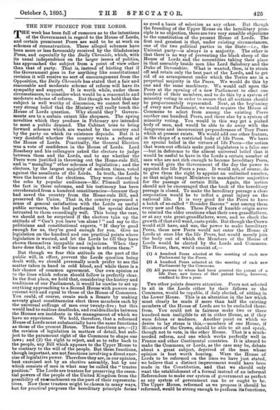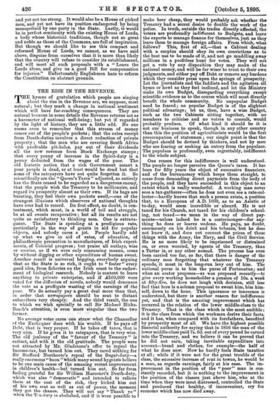THE NEW PROJECT FOR THE LORDS. T HE week has been
full of rumours as to the intentions of the Government in regard to the House of Lords, and certain prominent Peers are said to be at work on schemes of reconstruction. These alleged schemes have been more or less favourably received by the Gladstoman Press, and especially by the Daily Chronicle, which, with its usual independence on the larger issues of politics, has approached the subject from a point of view other than that of party. That is, instead of hinting that if the Government goes in for anything like constitutional revision it will receive no sort of encouragement from the Opposition, the Daily Chronicle has stated that a fair and reasonable and moderate scheme of reform will have its sympathy and support. It is worth while, under these circumstances, to consider what would be a reasonable and moderate scheme of reform. But though we hold that the subject is well worthy of discussion, we cannot feel any very strong belief that the Ministry will really touch the House of Lords question. Why should they ? Govern- ments are to a certain extent like shopmen. The spring novelties which they produce in February are intended to meet a public demand. The Cabinet tries to bring forward schemes which are wanted by the country and by the party on which its existence depends. But it is very doubtful whether the country wants a reform of the House of Lords. Practically, the General Election was a vote of confidence in the House of Lords. Lord Rosebery and his colleagues asked the electors to judge between them and the Lords, and to say whether the Peers were justified in throwing out the Home-rule Bill, and in " mangling " other schemes of legislation ; and the electors, by the largest majority of modern times, voted against the assailants of the Lords. In truth, the Lords were the heroes of the elections. They were cheered to the echo by popular audiences—Mr. Plimsoll noticed the fact in these columns, and his testimony has been corroborated from a hundred constituencies—because they had saved the country from the Home-rule Bill, and preserved the Union. That is, the country expressed a sense of general satisfaction with the Lords as useful public servants, who had performed the special duties intrusted to them exceedingly well. This being the case, we should not be surprised if the electors take up the attitude of "Can't you leave 'em alone ? " and say to the politicians and constitutional experts, "If they're good enough for us, they're good enough for you. Give us legislation on the hundred and one practical points where legislation is wanted, and let the Lords be till they have shown themselves incapable and injurious. When they have done that, it will be time enough to reform them."
But though we fear this attitude on the part of the public will, in effect, prevent the Lords question being dealt with, we should personally much prefer to see the matter taken in hand in cold blood, and while there is a fair chance of common agreement. Our own opinion as to the lines which reform should follow is perfectly clear. In the first place, we hold that, considering the history and traditions of our Parliament, it would be unwise to set up anything approaching to a Second House with powers con- current with and equal to those of the House of Commons. You could, of course, create such a Senate by making seventy giant constituencies elect three members each by the universal suffrage of men over twenty-five ; but this would lead to endless deadlocks, and realdeadlocks between the Houses are incidents in the management of which we have no experience. We hold, therefore, that a reformed House of Lords must substantially have the same functions as those of the present House. These functions are,—(1) the revision of legislation in matters of detail, but sub- ject to the paramount right of the Commons to shape our laws ; and (2) the right to reject, and so to refer back to the people, any Bill which appears to the Upper House to be contrary to the will of the people. But these functions, though important, are not functions involving a direct exer- cise of legislative power. Therefore they are, in our opinion, best exercised not by an elective assembly, but by one which consists of men in what may be called the "trustee position." The Lords are trustees for preserving the essen- tial powers of the people of the United Kingdom from the possibility of eneroachment on the part of their representa- tives. Now these trustees might be chosen in many ways, but for practical purposes the hereditary principle forms as good a basis of selection as any other. But though the founding of the Upper House on the hereditary prin- ciple is no objection, there are two very sensible objections to the constitution of the present House of Lords. The first and greatest is that, under existing circumstances, one of the two political parties in the State—i.e., the Unionist party—is always in a majority. The other is that there is no way of preventing the black sheep of the House of Lords and the nonentities taking their place in that assembly beside men like Lord Salisbury and the Duke of Devonshire. What is wanted, then, is to strain off and retain only the best part of the Lords, and to get rid of an arrangement under which the Tories are in a perpetual majority in the Peers. We would do this by one and the same machinery. We would call upon the Peers at the opening of a new Parliament to elect one hundred of their members, and to do this by a system of minority voting in order to secure that all sections should be proportionately represented. Next, at the beginning of every new Parliament, we would require the House of Commons to select from among the existing Peers another one hundred Peers, and these also by a system of minority voting. You would in this way get a picked body of men, and would be able to do away with the dangerous and inconvenient preponderance of Tory Peers which at present exists. We would add one other feature, in the shape of a restricted body of life Peers. We have no special belief in the virtues of life Peers—the notion that worn-out officials make good legislators is a false one —but in deference to the almost universal belief that it would be useful to have in the Lords a certain number of men who are not rich enough to become hereditary Peers, we would give the Government of the day the power to appoint five life Peers a year. It would not, of course, do to give them the right to appoint an unlimited number, as that might tempt Ministers to manufacture majorities for the passage of certain Bills. Again, the notion should not be encouraged that the book of the hereditary peerage is closed. To make the hereditary peerage a close corporation would be to inflict a great injury on the national life. It is very good for the Peers to have a batch of so-called "Bounder Barons" sent among them every now and then. These Peers of humble origin serve to remind the older creations what their own grandfathers, or at any rate great-grandfathers, were, and so check the growth of that evil weed, caste-pride. But though the Crown would still have, and use, the power to make hereditary Peers, these new Peers would not enter the House of Lords at once like the life Peers, but would merely join the body out of which the Members of the House of Lords would be elected by the Lords and Commons. The House, then, wound consist of,—
(1) A hundred Peers ielected at the meeting of each new Parliament by the Peers.
(2) A hundred Peers selected at the meeting of each new Parliament by the Commons.
(3) All persons to whom had been granted the patent of a life Peer, new issues of that patent being, however, confined to five a year.
Two other points deserve attention. Peers not selected to sit in the Lords either by their fellows or the Commons, would be capable, if duly elected, of sitting in the Lower House. This is an alteration in the law which must clearly be made if more than half the existing members of the House of Lords are to be excluded there- from. You could not in fairness make two or three hundred men ineligible to sit in either House, as if they were felons or madmen. Another point on which we desire to lay stress is this,—members of one House, if Ministers of the Crown, should be able to sit and speak, though not to vote, in the other House. That is a much- needed reform, and one which works perfectly well in France and other Continental countries. It is absurd to make the Commons, 'or Lords, as the case may be, debate about a great subject, deprived of the man whose opinion is best worth hearing. Were the House of Lords to be reformed on the lines we have just stated, we believe that a distinct improvement would have been made in the Constitution, and that we should only want the establishment of a formal instead of an informal Referendum to make our system of government as perfect as any system of government can be or ought to be. The Upper House, reformed as we propose it should be reformed, would be strong enough to perform its functions, and yet not too strong. It would also be a House of picked men, and yet not have its position endangered by being monopolised by one party in the State. Lastly, it would be in perfect continuity with the existing House of Lords, a body whose historical traditions, though not so great and noble as those of the Commons, are full of inspiration. But though we should like to see this compact and reformed House of Lords, we cannot, as we have said above, disguise from ourselves that it is more than likely that the country will refuse to consider its establishment, and will meet all such proposals with a "Leave the Lords alone, and give us a good Bill for compensation for injuries." Unfortunately Englishmen hate to reform the Constitution on abstract grounds.







































 Previous page
Previous page